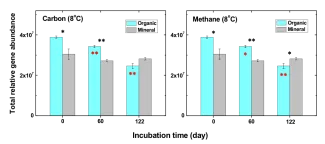Microbial decomposition of soil organic carbon (SOC) in thawing Arctic permafrost is important in determining greenhouse gas feedbacks of tundra ecosystems to climate. However, the changes in microbial community structure during SOC decomposition are poorly known. In this study, we examined microbial community changes using frozen soils from Barrow, Alaska, USA, in anoxic microcosm incubation at –2 and 8 °C for 122 days. The functional gene array GeoChip was used to determine microbial community structure and the functional genes associated with SOC degradation, methanogenesis, and Fe(III) reduction. Results show that soil incubation after 122 days at 8 °C significantly decreased functional gene abundance (at P < 0.05) associated with SOC degradation, fermentation, methanogenesis, and iron cycling, particularly in organic-rich soil. These observations correspond well with decreases in labile SOC content (e.g., reducing sugar and ethanol), methane and CO2 production, and Fe(III) reduction. In contrast, the community functional structure was largely unchanged in the –2 °C incubation. Soil type (i.e., organic vs. mineral) and the availability of labile SOC were among the most significant factors impacting microbial community structure. These results demonstrate the important roles of microbial community in SOC degradation under climate warming scenarios and thus provide mechanistic understanding of SOM decomposition and enable enhanced fine-scale process C cycle modeling.
Figure below shows microbial functional diversity decrease during incubation with the organic layer soil at 8 °C. Microbes also express higher levels of glycosidase genes in organic than mineral soils during incubations, producing more reducing sugars and initially higher levels of CH4 and CO2.
For more information, please contact:
Baohua Gu
gub1@ornl.govDavid Graham
grahamde@ornl.gov

